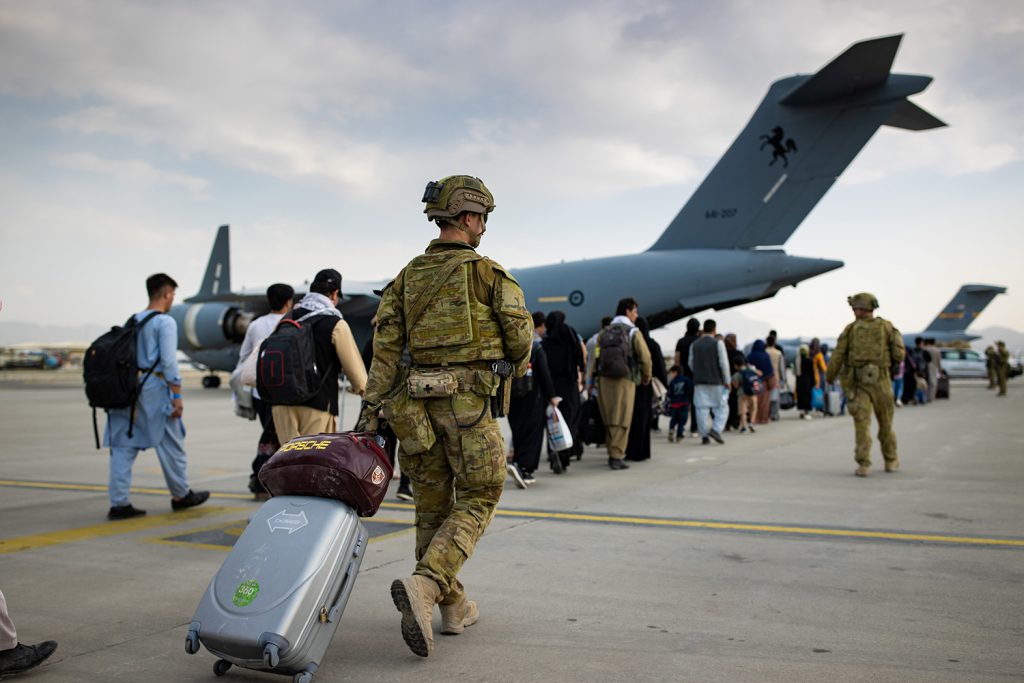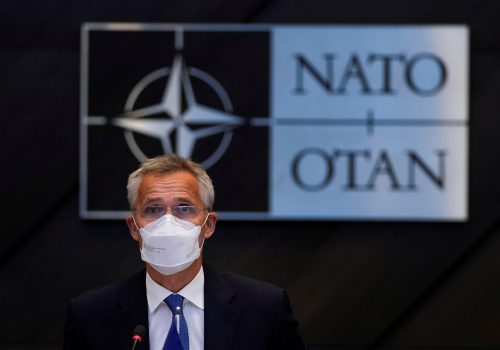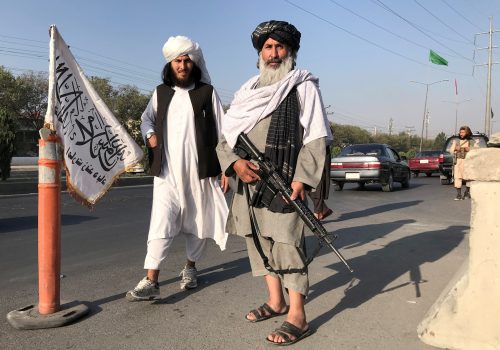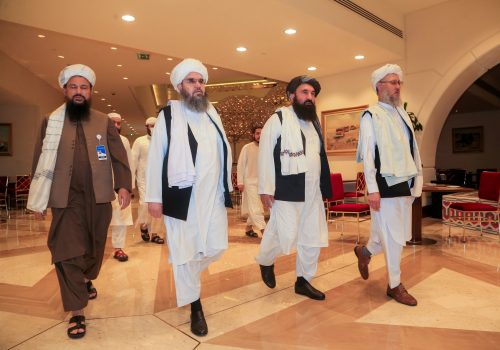For many US allies, the end of the conflict in Afghanistan will come as a relief, reassuring them that some clear, rational strategic thinking has taken hold in Washington.
Few had predicted how quickly Kabul would fall and how rapidly the Afghan military forces would collapse. Thursday’s suicide bombings outside Kabul airport, killing thirteen American troops and dozens of Afghans, underscored the tragedy. In some corners of the world, the fall has led to a chorus of commentators lamenting both the Taliban’s success and an apparent undermining of US credibility with allies. Others have called out and argued against what they consider to be “myths,” including that the US presence in Afghanistan was unsustainable, that the rapid collapse was evidence that success in Afghanistan was never possible, and that Afghanistan distracted the United States from its great-power competition—instead drawing attention to a peripheral region.
These alleged “myths” are all facts if you ask many analysts and US allies. So while US allies, especially those in the Asia-Pacific, are disappointed about the speed of Afghanistan’s collapse and the resulting humanitarian crisis, they can look to this overall tragedy to find reassurance in the United States.
As Lowy Institute Research Fellow Rodger Shanahan said, “The idea that the war in Afghanistan could continue to be ‘low cost’ (not that it ever was) amounts to a fantasy.” It was clear from the speed of the capture of Kabul that the Afghan government had little credibility with the population it was supposed to represent.
Many commentators also persist in the belief that supposedly “abandoning” Afghanistan will lead to allies losing faith in the United States. In Australia, it is a line of commentary that has gained some traction in the Rupert Murdoch-owned News Corp Australia. But the argument just doesn’t stack up.
As US national-security scholar Daryl Press has shown, the fundamental belief held by civilians and many policymakers that past actions and backing down during a crisis reduces a country’s future credibility is false. Rather, it is power and interest that count. Australian scholar Iain Henry has shown that supposedly “disloyal” behavior by allies does not count in either a moral or objective sense. Instead, off the back of the withdrawal from Afghanistan, US allies will be focused on assessing whether security interests between the members of their alliance still exist.
A number of other Australian scholars of US and Asian affairs such as Andrew Carr and Ashley Townshend have similarly argued that US focus is better directed toward parts of the world where it has a strong strategic interest. The US overcommitments to Iraq and Afghanistan, conflicts that posed no existential threat to the United States once terrorist groups were degraded, have been both tragic and frustrating. These conflicts have been a drain on US resources and strategic attention. After this costly and unsuccessful affair, US allies in the Asia-Pacific, like Australia, should only be reassured by the US President Joe Biden’s August 14 remarks:
“One more year, or five more years, of US military presence would not have made a difference if the Afghan military cannot or will not hold its own country. And an endless American presence in the middle of another country’s civil conflict was not acceptable to me.”
At a time in which the United States is undertaking a new Global Posture Review, US allies in Asia should welcome the steadfastness of Biden’s decision to withdraw from Afghanistan. Asia has been waiting far too long for the United States to reprioritize its global commitments. In this region, Australia has often been regarded as the canary in the coal mine, providing early warnings about China and broader regional security. The US-Australia alliance is instructive in itself but can also be seen as emblematic of the broader US position in Asia.
Australia is one of the United States’ closest allies in the Indo-Pacific. Australians have fought alongside the United States in every major conflict for more than a century—the so-called one hundred years of mateship—and Australia was the largest non-NATO contributor and the ninth-largest troop contributor to operations in Afghanistan. It withdrew from combat operations in the country in 2013 but continued to provide a small number of troops for military training and support until earlier this year.
In recent days, Australian Prime Minister Scott Morrison has called the situation in Afghanistan “very distressing.” Defense Minister Peter Dutton called it “disappointing and tragic.” But there have been no calls from the Australian government for the United States and its partners to intervene to save the fallen Afghan regime. Like Australia, no US ally in the Asia-Pacific should be worried that the US withdrawal from Afghanistan will lead to a lack of resolve elsewhere.
For Australia and many other allies, those US national interests and priorities should lie in Asia. It is not forgotten that former US President Barack Obama outlined what would become his vision for a US pivot to Asia in a 2011 speech to the Australian Parliament in Canberra. That strategic rebalancing led to new US global force-posture initiatives including the rotation of a US Marines air-ground task force in Darwin starting in 2012. By withdrawing from Afghanistan, the US government is simply reassessing, once again, the balance of its global commitments, and its eyes are firmly fixed on the Asia-Pacific.
There is one simple reason for this reassessment—the changing strategic balance in the region. The rise of a more assertive, authoritarian, and powerful China represents a major challenge to the rules-based international order, the balance of power in the region, and the interests of the United States and its allies.
In fact, rather than urging the United States to intervene to save the Afghan government, the Australian government has been advocating for an increase in the number of US Marines in Darwin.
The China challenge has been evident since the start of deepening US military commitment to the Middle East and South Asia after 9/11. As Australia withdrew from combat operations in Afghanistan in 2013, the trajectory towards competition with China was clearer. As former Australian Foreign Affairs and Defense Minister Stephen Smith noted recently, a much more assertive and aggressive China under President Xi Jinping has ended Bob Zelleck’s idea of a “responsible stakeholder,” whereby China is turned into a rule-abiding and system-sustaining member of the international community. The militarization of the South China Sea, political interference, trade coercion, the failure of “One Nation, Two Systems” as a constitutional principle in Hong Kong, the internationally deplorable treatment of Uyghurs in Xinjiang, clashes on the China-India border, intellectual and commercial property breaches, and cyberattacks have made it clear that China is a revisionist power only too willing to use coercion and force.
While the United States, NATO, Australia, and other countries should do everything they can to rescue and resettle friends and supporters in Afghanistan, US allies in the Asia-Pacific should feel reassured by Biden’s resistance to calls for reengagement. The United States is refocusing on strategic priorities, and that’s a good thing for Asia.
Peter J. Dean is a nonresident senior fellow in the Forward Defense practice of the Atlantic Council’s Scowcroft Center for Strategy and Security. He is also chair of Defence Studies and director of the University of Western Australia Defence and Security Institute.
Further reading
Image: Australian citizens and visa holders prepare to board the Royal Australian Air Force C-17A Globemaster III aircraft, as Australian Army infantry personnel provide security and assist with cargo at Hamid Karzai International Airport in Kabul, Afghanistan on August 22, 2021. Photo via Sgt. Glen McCarthy/ Australia's Department of Defence/Reuters.



